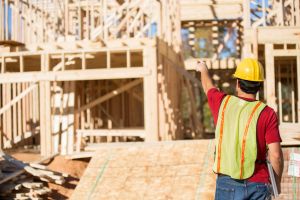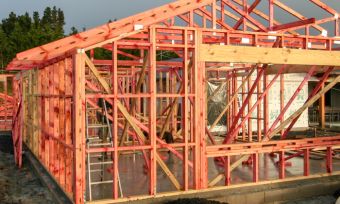Building consents in New Zealand are booming and an increasing number of people are buying off the plan. But while there are definite upsides to buying off the plan, it comes with many hidden risks. So before you put down your deposit, it pays to do plenty of homework to ensure that your best laid plans of home ownership run smoothly.
What to Look For When Buying Off the Plan. In this guide we cover:
- What is buying off the plan
- Pros of buying off the plan
- Cons of buying off the plan
- The developer
- The contract
- Ownership model
- Cost increases
- Your deposit
- Plans, size and quality of home
- Sunset clause
What is buying off the plan
Buying off the plan means buying a home that is yet to be built. A developer who is building a new residential complex puts up homes or apartments for sale. They provide architects’ impressions of what the homes will look like on completion, and often build a physical show home that you can visit to get a sense of the finished build.
If you agree to a purchase, you usually make a small upfront payment as a sign of goodwill until the contract is agreed upon and signed. At this point, you pay the main deposit of around 10%. Once the developer has finished building, if all goes smoothly, you pay the remainder of the cost of your new home and move in.
Pros of buying off the plan
There are many upsides to buying off the plan. First and foremost, you get to enjoy all the benefits of a brand new home: it’ll be modern, insulated and you won’t need to embark on a series of costly repairs or renovations the moment you move in, as you might with an older home. Most developers also offer a degree of personal customisation.
There are financial benefits, too. As you only need to pay a small deposit upfront – usually around 10% – you’ll have extra time to further build your savings towards the final cost.
As builds stretch for many months, you also have more time to arrange finance. And, in a heated market, you’ll not have to battle against other bidders at auction, which can artificially inflate a property’s true worth.
If you are a first home buyer taking advantage of the government’s First Home Grant, you could also be eligible for a First Home Grant of up to $10,000. This is double the amount available if you’re buying an existing home.
Plus, if house prices increase during the build of your project, by the time you move in you could enjoy substantial capital gains.

Cons of buying off the plan
Buying off the plan does come with the inherent risks associated with all new building projects. These can include:
- Financial mismanagement by the developer
- Delays in build
- Inflation of original costs
- Substandard build
- Unacceptable changes to original building plans
If the housing market drops during the building process, you could also be left with a home worth less that its original asking price. Although negative house price inflation would affect all property owners during the same period.
Overall, your main concern should be the reputability of the developer. But if you do your homework, and get professional help at every step of the process, from lending to legal, buying off the plans should be a straightforward process.
Here are the main points that you should be aware of:
The developer
Always thoroughly research the reputation of the developer – the company and the people behind the company. And this doesn’t just mean visiting the development’s own website.
Behind the name and branding of the building project, there will be many other companies and individuals. All of them need to be the focus of your due diligence.
Research previous building projects that the developers have been involved with. Use tools such as the NZ Companies Register and the Insolvency Register to investigate the directors and the companies involved. Get Googling!
The contract
Before you sign anything, have your lawyer or conveyancer go over the contract in meticulous detail. Remember it’s the developer’s contract so, naturally, it’s going to favour them. Some of the main points to look out for include:
Ownership model
What type of property ownership model is planned: freehold, leasehold or unit title. The type of ownership will determine if there will be a body corporate, or if you’ll need a residents agreement to cover communal areas. In both cases it will affect ongoing maintenance costs.
Cost increases
Can the developer pass on increases in construction costs? If they can, you could be left with a home you can no longer afford. And if they can’t, the developer might have to cut corners on the build quality.
Your deposit
Find out who is holding your deposit and what’s happening to any interest it’s earning. Ideally, it should be held in a trust account, so it can’t be misappropriated and you can get it back should the developer not meet the terms of the contract.
Plans, size and quality of home
Show homes and mocked-up images are not 100% true representations of the finished build. Most contracts allow for the developer to make structural changes during the build that can detrimentally impact the size and shape of your new home. They can also swap building materials, or change chattels and appliances, that can alter appearance and quality.
So ask plenty of questions about the quality of the build. Are they adhering to minimum building standards for things such as sound-proofing, or are they opting for extra quality? What are the minimum interior dimensions?
Once you sign the contract, you’ll lose your bargaining power. So ensure everything you demand of the property is laid out in the contract before you commit.
Sunset clause
A sunset clause is a common term used in contracts to protect buyers and sellers. In most cases, the sunset clause will specify the date by which the developer must complete the project. If the property is not completed by that date, the buyer is legally allowed to abandon their contractual obligations and receive their deposit payment back in full.
While sunset clauses can safeguard buyers against a building development that’s gone way over time and budget, it can be exploited by unscrupulous developers. Over the ditch in Australia, in the face of rapidly rising house prices, some developers have purposely delayed their projects, cancelling the original contracts, in order to re-sell the homes at an increased profit. As a result, new laws have been passed to limit the practice.
Thankfully, here in New Zealand, we’ve yet to encounter such predatory practices. However, it doesn’t mean you should ignore the possible ramifications of a sunset clause in your contract.
Set the ground rules
All major financial transactions involve elements of both trust and risk, and purchasing a new home off the plans is no exception. However, if you go into the transaction with your eyes open, do your research and engage the advice of professionals at all stages, everything should run smoothly.
Talk to your lawyer and the developer, and get your demands written into the contract. Note: good developers will regularly communicate on the build’s progress and the expected completion date.
If you and your developer work together and set the ground rules for transparency, there should be no unexpected surprises and everything about your new build should go exactly to your off-the-plan plans!
Compare home loan rates for free with Canstar!
Enjoy reading this article?
Sign up to receive more news like this straight to your inbox.
By subscribing you agree to the Canstar Privacy Policy





Share this article